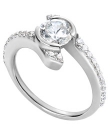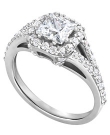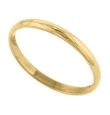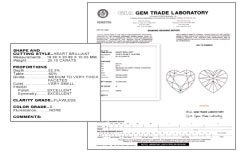14K White Gold Bypass Ring with Bezel Setting and Diamond Sidestones (.34 ct. tw.)




Thank you Lisa and Jill and everyone at Danforth for the most beautiful
ring I've ever seen. It looked great on the computer and when it arrived,
I was amazed. Nice work and it's a big hit. Thank you again for getting it
here when I needed it. We will contact you for future purchases and highly
recommend your company for jewelry.
Sincerely
Dennis & Deanna
Diamond Certification - Why it's Important
A certificate is the blueprint of the loose diamond. The certificate, also known as a cert, grading report, or diamond dossier confirms the exact properties of your diamond. The cert provides the measurements, weight, cut and quality of the diamond. The diamond certificate does not give the monetary value of the diamond because of diamond market fluctuations and differences in diamond mark-ups. A certificate is also useful for identification purposes in the future. For example, the case of a lost or stolen diamond, a certificate will facilitate its replacement with a diamond of equivalent quality. Appraisals are documents that state the approximate retail replacement value of an item.
![]()
![]() Though there are many grading laboratories out there, the two most respected are the Gemological Institute of America (GIA) and the American Gem Society Laboratories (AGS). They are known throughout the industry for having the most discerning, consistent and uniformly unbiased systems for grading loose diamonds. You cannot go wrong if you look for these names on the grading report before you buy. However, IGI - International Gemological Institute and EGL - European Gemological Laboratories are becoming more popular.
Though there are many grading laboratories out there, the two most respected are the Gemological Institute of America (GIA) and the American Gem Society Laboratories (AGS). They are known throughout the industry for having the most discerning, consistent and uniformly unbiased systems for grading loose diamonds. You cannot go wrong if you look for these names on the grading report before you buy. However, IGI - International Gemological Institute and EGL - European Gemological Laboratories are becoming more popular.
Expert Guidance
Danforth Diamond carries both certified and non-certified diamonds. The original copy of the grading report is included with every purchase of a loose certified diamond or a certified diamond engagement ring. Take the time to understand how to read a certificate; however, your diamond purchase should not be based solely on this document. It must be beautiful to you.
Finally, remember that diamond certificates are not guarantees, valuations or appraisals. While professional labs employ well-trained graders and use the most accurate gemological instruments to grade gemstones, labs make no warranties regarding the accuracy of their certificates. However, you can rely on our 75 years of jewelry expertise to ensure you're getting the correct diamond grade at a great value.
How to Read a Diamond Certificate
 By understanding how expert gemologists judge the quality of gemstones using diamond certification, you can better understand what compromises you are willing to make in the final selection. This information on how to read about diamonds will help you make these decisions.
By understanding how expert gemologists judge the quality of gemstones using diamond certification, you can better understand what compromises you are willing to make in the final selection. This information on how to read about diamonds will help you make these decisions.
When looking at a diamond report or cert, you will notice each specific diamond is issued an identification number and the date and time that the report was done. The report lists the instruments used to measure, examine, describe, and grade the diamond. The report also describes the diamond's shape and cut, the clarity and color, and any other comments about the stone. There is also a diagram, which plots the internal and external characteristics of the diamond.
Here is what to look for in a reliable diamond certificate:
Unique Identification Number - Very often, this ID is laser inscribed in the girdle.
Shape and Cutting Style - The shape of the stone such as round brilliant, square modified brilliant commonly known as princess, pear shape, or step cut emerald cut.
Measurements - The diamond's dimensions expressed in hundredths of a millimeter. Exact dimensions are very important in identifying a diamond, as it is unlikely that two diamonds will have identical weight and dimensions.
Weight - The weight to the hundredth of a carat expressed as a 2 digit decimal.
Proportions
Depth - The depth divided by average diameter for rounds, or depth divided by width for a fancy shape expressed as a percentage. This can greatly influence the brilliance. A shallow or deep diamond will cause light to reflect out of the sides causing the stone to lose its fire. Round diamond depth should fall within 56.5 - 65%.
Table - The table facet divided by the average diameter for round, and divided by the width for a fancy shape.
Girdle - The band around the widest part (or circumference) of a diamond.
Culet - The size or sharpness of the culet facet or it's pointy-ness.
Finish
Polish - The overall smoothness of the faceting and the craftsman's workmanship.
Symmetry - The balance between one quadrant of the stone and its opposing side.
Clarity Grade - The GIA range of qualities measuring imperfections.
Color Grade - The GIA range measuring degrees of increased body color.
Fluorescence - Strength of different colors when viewed under UV light. Learn more about fluorescence.
Comments - The description of additional characteristics not in the report, that may not even affect the value of the diamond.
What is an Appraisal?
An Appraisal is a diamond certification document that states the approximate retail replacement value of the diamond or jewelry. Appraisals are mainly used to value the item for insurance policies and replacement of the jewelry. It is calculated by using the cut, color, clarity and carat weight of the diamond and the current diamond market prices. If the appraisal is for a piece of jewelry, the weight of the precious metal, the labor, and the craftsmanship is included.
An appraisal ensures that in the event of theft, loss or damage to the item your insurance company will replace the jewelry. The more information on the appraisal, the better the chance you will receive an equal replacement for your diamond ring from your insurance company.
Expert Advice
Some people think that the higher the appraisal the better, not necessarily. If you are going to use the appraisal for an insurance loss, remember the higher the price of the jewelry or diamond the higher the insurance premium. Only get insurance for the minimum replacement cost. Make sure you get a policy that covers replacement cost. Due to diamond market fluctuations, a diamond that you paid $5000 for today will most likely cost more ten years from now.
Danforth Diamond offers an appraisal for all engagement rings as an added benefit to our customers.
Use the links below to learn more about diamonds and the 4 C's:
Now that you’ve learned all about diamonds; use your knowledge to shop for your perfect diamond engagement ring.
